HORUS HERESY
The Horus Heresy was a galaxy-spanning civil war that consumed the worlds of Mankind for 9 Terran years.
For a complete chronology of the events of the Horus Heresy please see Horus Heresy Chronology.
The Horus Heresy outbreak marked the end of the Emperor of Mankind's Great Crusade to reunite the scattered colony worlds of humanity under a single government and the beginning of the current Age of the Imperium. The Horus Heresy is in many ways the founding event of the Imperium of Man as it now exists. The civil war began following the corruption by the Ruinous Powers of Chaos of the Imperial Warmaster Horus Lupercal, the Primarch of the Sons of Horus Legion and the most beloved genetic son of the Emperor. The Chaos Gods fed Horus' innate ambition and sense of betrayal by the Emperor until he turned upon his father and sought to claim the Imperium of Man for his own.
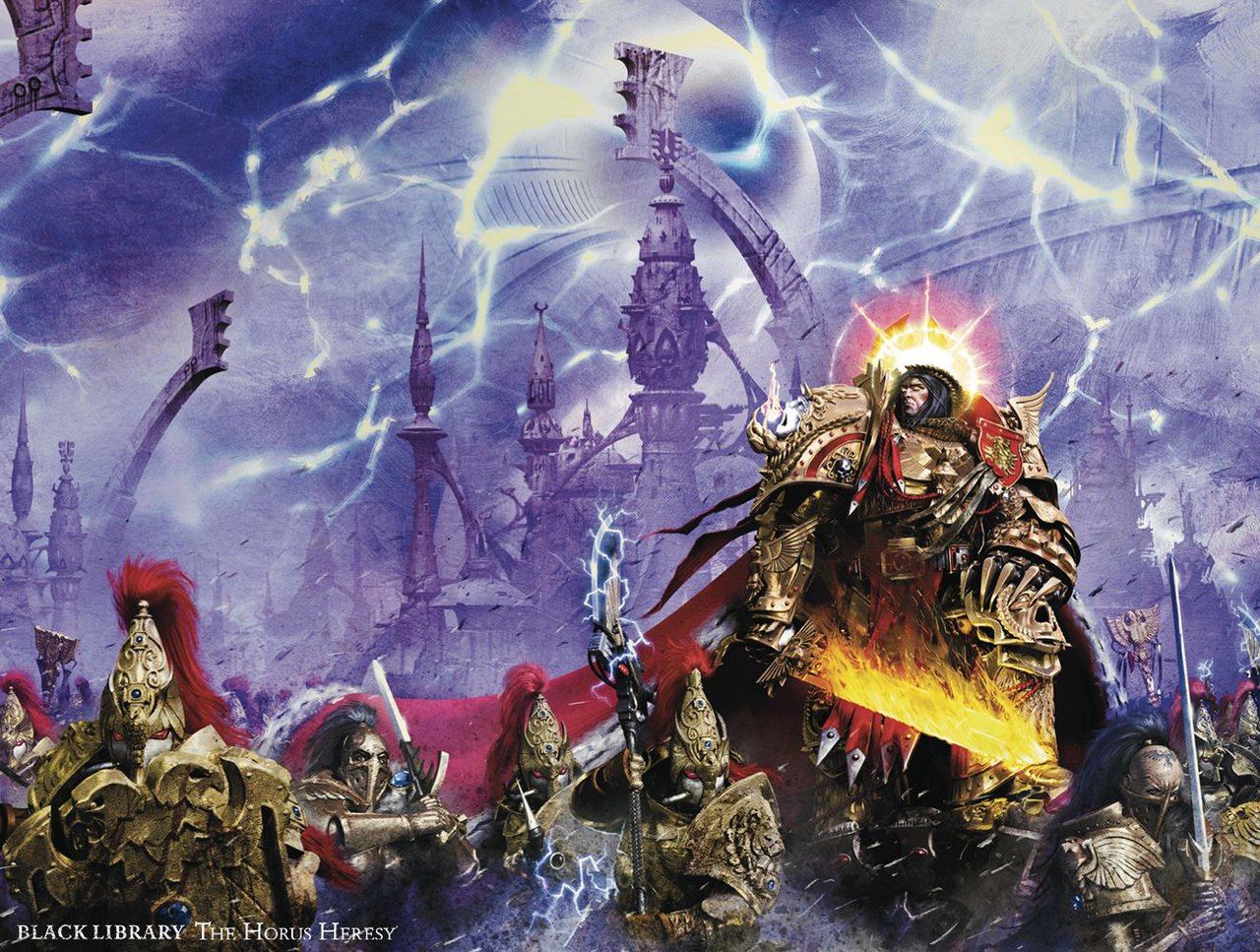
Seeds of Heresy Sown
After more than 200 standard years of hard conflict by the early 31st Millennium, over two million human-settled worlds across the Milky Way Galaxy had been reclaimed by the Emperor in the name of the Imperium of Man. Beside him had stood the Primarch Horus, who had fought alongside the Emperor for the early part of the Great Crusade as his only rediscovered son and primary military commander, glorying in the singular attentions of his father. The long wars had forged a strong bond between them, and they were truly father and son. But now the Emperor had to consolidate his newborn Imperium, and undertake the next phase of his Grand Plan. He intended to create a Webway through the Immaterium much like that used by the Eldar that would be open to humanity by wielding the psychic augmentation technology of the artefact from the Dark Age of Technology known as the Golden Throne. This work required his continued presence on Terra, and so after Horus' magnificent victory in the Ullanor Crusade, against the largest horde of Orks ever encountered in the galaxy at that time, the Emperor departed and left Horus in charge of the Great Crusade with the exclusive title of "Warmaster." As Warmaster, Horus was the commanding general of all of the Imperium of Man's military forces, charged with leading the other Primarchs and their Legions through the remainder of the Great Crusade. At this announcement there was much shock and outrage. Many of the other Primarchs did not understand why the Emperor was leaving them to fight the enemies of Mankind alone and, worse still, why Horus should be raised as the first amongst equals. Rogal Dorn, Sanguinius and Fulgrim were pleased for their brother, the new Warmaster, while others -- such as Angron, Roboute Guilliman, Lion El'Jonson and Perturabo -- all reacted with varying degrees of disapproval. The situation only grew worse when the Emperor announced that he would be creating a civilian administrative bureaucracy known as the Council of Terra that was comprised of Imperial bureaucrats and nobles to carry out the day-to-day governmental affairs of the Imperium, replacing the direct rule of the Emperor while he was engaged in his secret Imperial Webway Project.
The Council of Terra would implement and administer the new galaxy-wide tax of resources and manpower called the Imperial Tithe and other matters of day-to-day law in the Imperium of Man while the Emperor focused on bringing his Webway Project to fruition using the technology of the Golden Throne. The Primarchs would be relegated to a primarily military role as the Imperium's most preeminent commanders. Many of the Primarchs, including Horus, were deeply disturbed that their father would make them subject to normal men and women who had never shed blood in the establishment or expansion of the Imperium and that he would remove them from the political positions of rule to which they believed they were entitled. The Emperor had sought to create a civilian bureaucracy for the Imperium precisely because he wanted regular human beings to learn to govern themselves once more and not become beholden to a permanent, genetically-enhanced ruling class. The Chaos Gods would ultimately use the Primarchs' resentment as one of the all-too-human weaknesses they could exploit to corrupt half their number.
Lords of the Imperium
After the decisive victory during the Ullanor Crusade, when Mankind's re-ascension to predominance in the galaxy was no longer in doubt, the Emperor bestowed upon the Primarch Horus Lupercal the title of Imperial Warmaster and ceded to him control of all the Imperium's military forces in the Emperor's stead. The other Primarchs were then instructed to follow Horus and obey him and complete the Great Crusade under his direction. There was, it is said, some disquiet among the Primarchs that the Emperor had decided to no longer fight alongside them, but the Emperor was as adamant as He was close-mouthed as to what He would do on his return to Terra. The Emperor then departed for the homeworld of Mankind and the dungeons deep beneath his great Imperial Palace to begin His great work on the creation of a human extension into the Eldar Webway under a veil of secrecy previously unknown in the Imperium. He drew to him certain advisors and retired to the private vaults deep beneath his city-fortress within the Imperial Palace. Upon his return to Terra, the Emperor called to his side Malcador and the Fabricator-General of the Mechanicum. He issued them with new commands. No longer were they to support the military campaigns, as these were now safely in the hands of his sons the Primarchs and the newly appointed Warmaster Horus. The Emperor needed time and all of his focus to be directed at his next great project, which would tie the newborn Imperium together and unite it as no other human polity had ever been united. To this end, the Emperor convened the first Council of Terra. Unlike the War Council, of which Horus was now the leader, the Council of Terra would attend to matters of state and the establishment and maintenance of Imperial Law across the myriad worlds of the Imperium.
In particular, the Council of Terra was to administrate the establishment of the Imperial Tithe of troops and resources from all the worlds of the Imperium that were required to support the Great Crusade. In effect, to the new Council of Terra would fall the entirety of the civil government of the Imperium. Malcador, the Emperor's most trusted advisor, was named as the First Lord of the Council and would lead it in the Emperor's absence. The Fabricator-General of the Mechanicum of Mars, Kelbor-Hal, Captain-General Constantin Valdor of the Legio Custodes and the Masters of the Adeptus Astronomica, the Adeptus Astra Telepathica and the Administratum of the Imperium were also appointed to the Council.
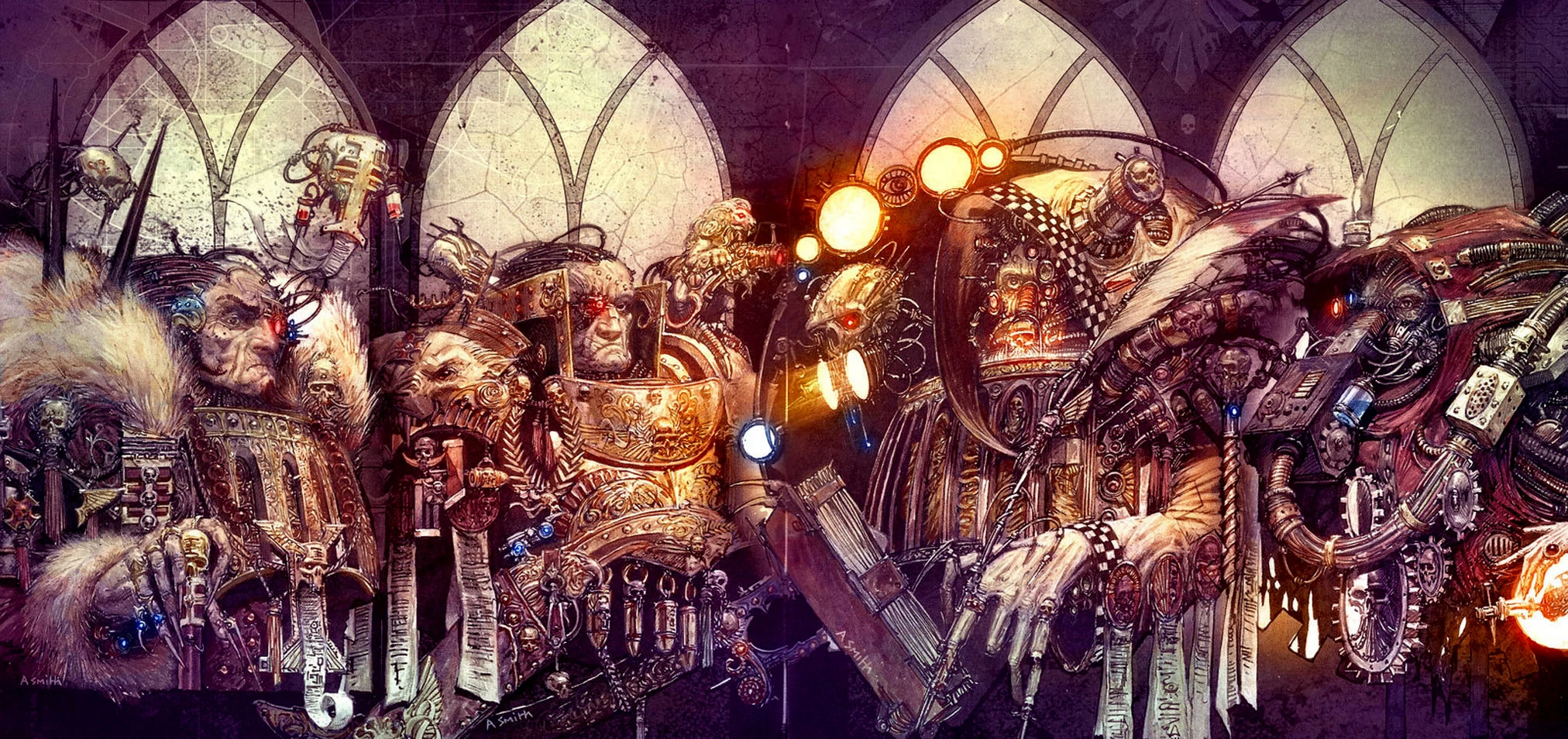
The creation of the Council of Terra, seen in this light, lent new weight to Horus' argument to several of his brothers that the Imperium had been betrayed by their father. He argued that the Emperor had proved more than willing to turn His back on his sons and generals and give power instead to petty mortal administrators and the sycophantic Tech-adepts of Mars who lacked the Primarchs' brilliance and superhuman abilities. As Horus prepared his rebellion against the Emperor, he convinced himself that petty functionaries and administrators had supplanted the Primarchs and the Astartes within the Imperium they had won. Once the Imperium had been wholly geared for the war and conquest that was its life's blood since its inception, but now Horus believed that it had become burdened with parasitic exectors, scribes and scriveners who demanded to know the cost of everything. Bureaucracy was taking over -- red tape, administrators and clerks were replacing the heroes of the age. Horus argued to his more receptive brothers that unless the Imperium changed its ways and direction, its greatness as an empire would soon be a footnote in history books. Horus feared that everything he and his brother Primarchs had achieved would be a distant memory of former glory, lost in the mists of time like the civilisations of ancient Terra. It was this hubris and arrogance that led to the Warmaster's inevitable fall to Chaos and the resultant civil war that would consume the entire galaxy, ushering in a new Age of Darkness that would last for millennia.
Yet Horus and his more resentful brothers had completely misunderstood the Emperor's intent in creating the Council of Terra. The Council was to become the body of civilian government that would administrate the myriad bureaucratic tasks needed for the survival of the newly formed human interstellar empire. The Emperor was determined that in His Imperium power would reside with those men and women who were governed by its apparatus and not with an artificial military elite composed of genetically-engineered beings who were so powerful that they already possessed only a very tenuous grip upon their own humanity. The Primarchs and their Space Marines had been created to give life to the Emperor's dream of a united human Imperium stretching across the galaxy and to defend it from humanity's myriad foes. They were not to rule it as a hereditary caste of immortal warriors imposing their whims upon those they deemed mere "mortals" by brute force.
Corruption of the Space Marine Legions
Long before the tragic events that would unfold on Istvaan III and initiate the conflict of the Horus Heresy, the Primarch Lorgar of the Word Bearers Legion had already committed himself and his Astartes to the service of the Ruinous Powers. Lorgar was a puritanical religious zaelot who was said to have experienced visions that foresaw the coming of the Emperor, who he believed to be a living God.
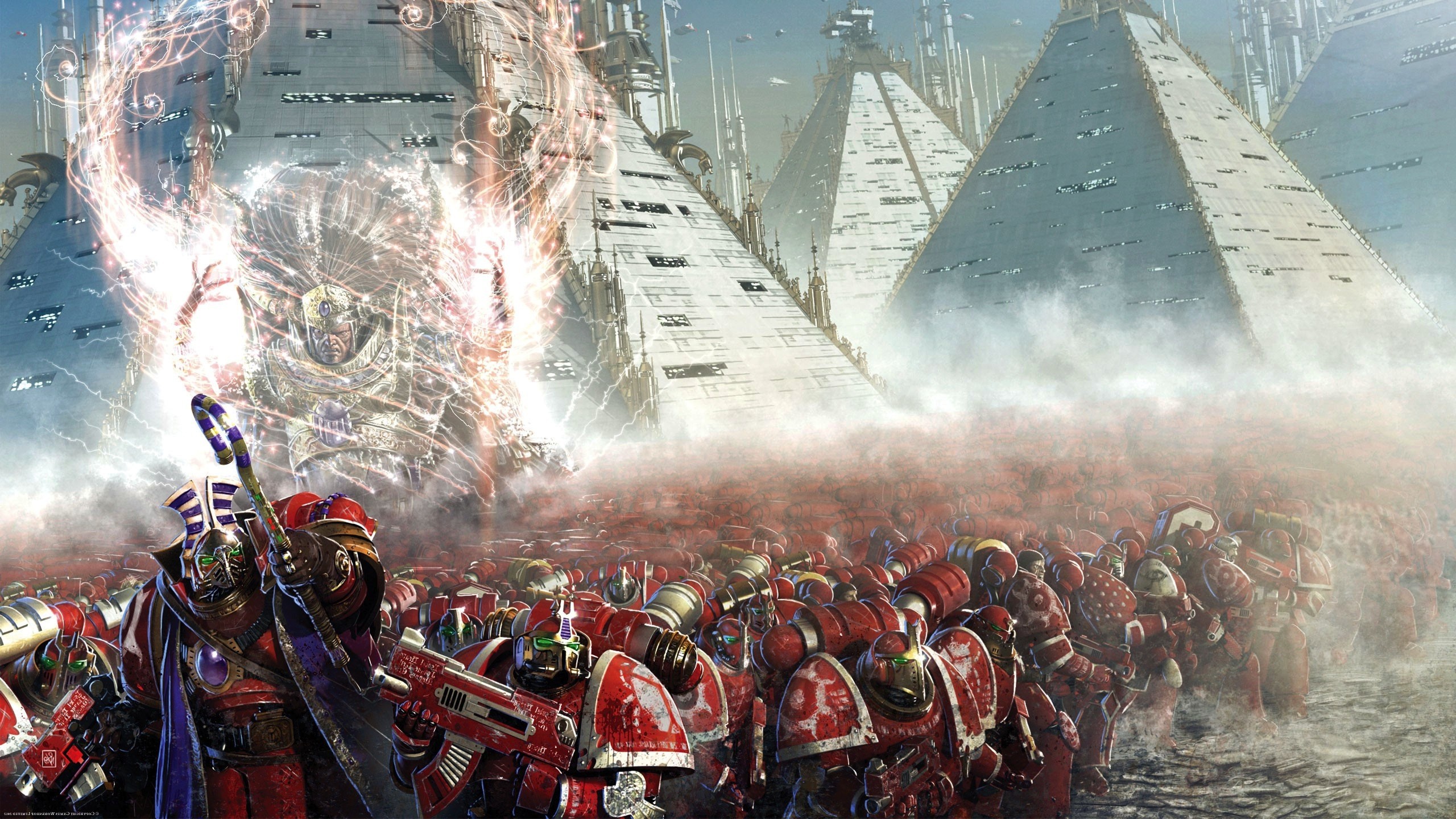
Fall of Horus
During the Great Crusade, it became apparent that the Primarchs were far from the perfect specimens of humanity they were intended to be. Although each Primarch was physically and mentally god-like compared to a baseline human being, they harboured the flaws of vanity, egotism, hunger for power, jealousy, arrogance, insecurity and all the other sins of the human character.
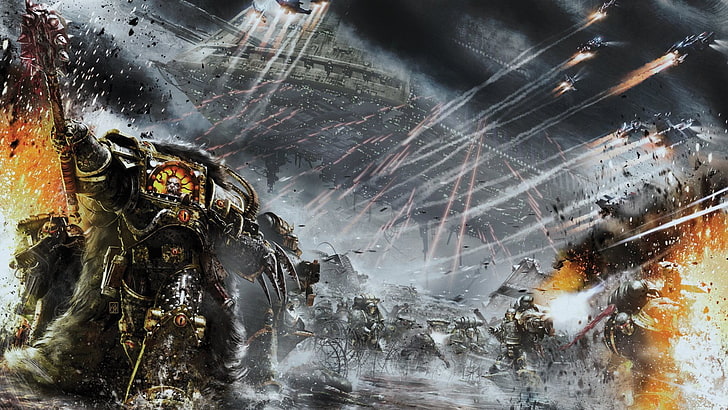
Route to Terra
Over the next nine Terran years, the combined Traitor fleets spread across the galaxy, unleashing a brutal civil war upon many of the planets that they had once helped to bring into the Imperium. Secretly guided by the Ruinous Powers, the Traitor Legions and their related support forces no longer worried about the rules of war, civilian casualties or proportionality; it was a common tactic of the Traitor fleets to simply unleash a total orbital thermonuclear bombardment upon a single inhabited world in a heavily defended Imperial star system to induce all of the other worlds and orbital installations to surrender. Casual brutality and even genocide became the norm for the Traitors as they fell ever more deeply under the control of Chaos. Slowly but methodically, Horus and the Traitor Legions forged a path across the galaxy lit by the burning nuclear pyres of countless worlds. Those planets spared the destruction faced an even worse fate: occupation and control by the Chaos-corrupted Traitor forces, who took great pleasure in unleashing the perversions of the Dark Powers upon the captive populaces. Many prayed to the Emperor for release from their torments, and the strength of the Lectitio Divinitatus cult that believed in the Emperor's divinity only began to grow as the nightmare of civil war scourged the Imperium of Man.
Battle for Terra
As the years of conflict across the galaxy passed, the ultimate aim of the Traitor Legions' destructive interstellar advance soon became clear: their goal was the conquest of Terra, the heart of the Imperium. With this conquest, Horus could fulfill his promise to the Chaos Gods and throw down the Emperor of Mankind, their greatest enemy. The Sons of Horus, the Death Guard, the Emperor's Children, the World Eaters, and elements of the Word Bearers prepared to rendezvous at Mars. The rest of the Word Bearers Legion was tasked with destroying Roboute Guilliman and his Ultramarines on the world of Calth in the Eastern Fringe of the galaxy.
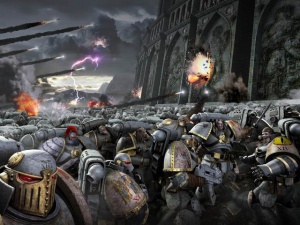
The Battle of Terra began with an orbital bombardment by the Warmaster Horus' fleet as the prelude to invasion. Although the Loyalist fleets and defenders fought back and the massive orbital defences on Luna reaped more than a quarter of the starships in the Traitor fleet they, like the Loyalist soldiers on the surface, were too few to face the combined forces of so many Traitor Legions, and were mowed down without mercy. After days of bombardment, the Chaos Space Marines landed on the surface of Terra in Drop Pods and advanced on the two spaceports nearest the location of the Imperial Palace to secure them in preparation for the main landings of the Traitor forces. Elements from five of the Traitor Legions participated in the battle, aided by the Traitor forces already on the surface. Despite the brave efforts of the Loyalists, the Eternity Wall and the Lion's Gate Spaceports fell within hours to the Forces of Chaos. Dark Chaos Cultists made their invocations, calling down the Greater Daemons of Chaos from the Warp directly onto Terran soil. With the spaceports secured, Horus' remaining troops of the Traitor Legions and their Traitor Imperial Army and Dark Mechanicus support forces landed en masse, and the hulking transports carried thousands of troops each. They also landed the terrible Traitor Titans that served the Warmaster's cause and had been infected with the daemonic power of Chaos. The transports' immense size made them prime targets for Terra's defence lasers. Although many of the Traitor landing craft were destroyed in-atmosphere, many more made it to the surface, disgorging yet more soldiers, main battle tanks and Traitor Titans to add to the besiegers' strength. They met stiff resistance from the Loyalists as the Imperial defenders knew that the survival of the Mankind's homeworld, their Emperor, and the future of the entire human race rested on their shoulders.
The Siege
The Chaotic besiegers forced the Imperial defenders back to the walls of the Imperial Palace, where thousands died slowing the assault. The Primarch Angron of the World Eaters Legion, now a Daemon Prince of the Blood God Khorne, came forth before the walls of the Palace and demanded the Loyalists' surrender, saying that they were cut off, outnumbered, and defended a ruler unworthy of their loyalty. Many would have surrendered to Angron after seeing the sheer power of the Forces of Chaos that stood arrayed before them had it not been for the Primarch Sanguinius, the winged and seemingly angelic leader of the Blood Angels Legion. The two Primarchs, once brothers, gazed at each other, perhaps communicating telepathically. Eventually Angron withdrew from before the gates of the Imperial Palace, telling his forces, not without some relish at the prospect of slaughter, that there would be no surrender. The siege of the Imperial Palace then began in earnest.
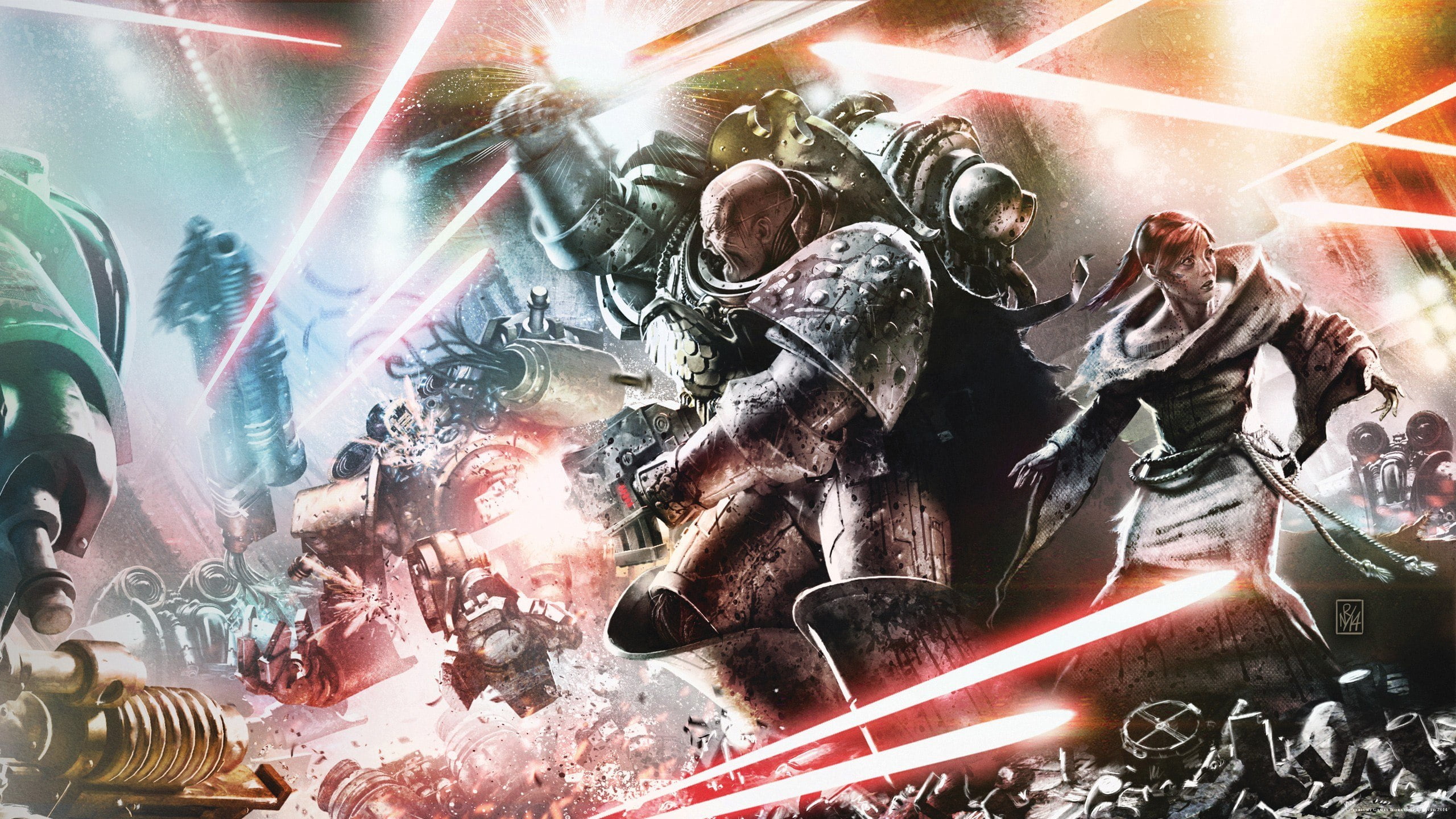
Inside the Palace, the defenders had been forced back to the Eternity Gate, the sole point of entry into the inner sanctum of the Imperial Palace. The Astartes of the Blood Angels and Imperial Fists tried to hold back the attacking Chaotic troops, while the remaining Loyalists made it through the Gate. Soon the mighty Bloodthirster Greater Daemon Ka'bandha came forth and bellowed out a challenge to Sanguinius in the name of his master Khorne. The daemon hurled itself at the Angel of Baal, barely allowing him time to parry the daemon's strikes. The two took to the air, trading blows and battle cries high above the heads of the two forces. Already fatigued from the long siege, Sanguinius was cast down by the daemon, pulverising the ferrocrete below upon impact. The Loyalist forces seemed to collectively groan at the fall of their great champion. Yet the Blood Angels' Primarch was not beaten, only stunned by the force of the impact. Sanguinius cleared his head, forced himself back to his feet, and once again took to the sky. The Angel seized the gloating daemon, holding it by the right ankle and arm. The Primarch hefted the creature high and broke its back over his knee, before hurling the daemon's carcass back at the besiegers, who howled in despair as the last Loyalists fell back and made it into the Imperial Palace's inner sanctum before the great portal of the Eternity Gate was shut tight behind them. Of course, as a daemon, Ka'bandah could not truly be slain, only banished to the Warp for a 1000 standard years, but the Bloodthirster's spirit was sent howling back into the Immaterium to meet the displeasure of his master the Blood God.
Malcador the Hero
The Terran Warp Gate would remain closed to the daemons for as long as the Emperor was able to power it from His throne atop the golden portal. Only the mightiest of human psykers had power enough to do this and even then most would be exhausted and fail in a short time. Only the Emperor Himself had the might to keep the gate closed permanently and for Him the effort grew harder as the daemonic forces gathered about Him. For as long as the daemon horde threatened to breach the portal, the Golden Throne would be His prison. As Horus' forces began their final assault on the Sol System and the Battle of Terra began nine standard years after the Traitors had first turned upon the servants of the Emperor at Istvaan III, the Sigillite returned from his mission to recruit the foundation of the Inquisition. Only through the most artful of psychic subterfuge were Malcador and his new recruits able to pass unscathed through the battlelines and come unharmed and unseen before the Emperor within the inner sanctum of the Imperial Palace.
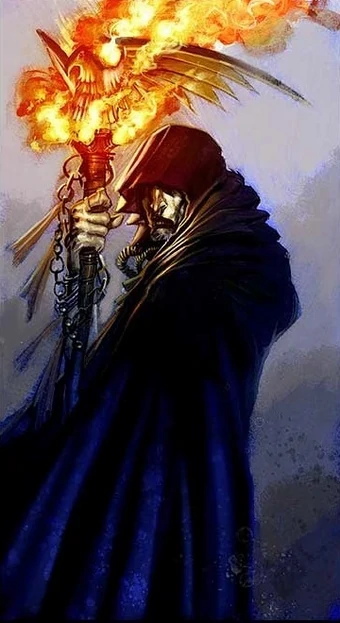
Endgame
The siege of Terra following the initial assault on the Imperial Palace lasted for 55 days. Both sides knew that the defeat of the Imperium of Man was near after the defence of the Eternity Gate. Sensing this, and knowing that he must complete the siege before the arrival of Loyalist reinforcements from the other Space Marine Legions that were already on their way, Horus prepared to teleport to the surface from his flagship, the Vengeful Spirit, to lead his forces in person. Before this could happen, the Word Bearers' First Chaplain Erebus broke the news to Horus: their daemonic allies in the Warp had informed them that the Dark Angels and Space Wolves Legions were nearing Terra; and the Ultramarines were only a short distance behind. At that moment, Horus despaired; his gamble had failed, weeks of further conflict would be needed to break the defenders and the Emperor's reinforcements would arrive in mere hours. What happened next is disputed in the Imperial historiography of the Heresy; some believe Horus disabled his Void Shields as he experienced one last moment of regret for his betrayal of his father and his turn to Chaos, while others believe it was a personal challenge to the Emperor. Nevertheless, Horus lowered the Void Shields of his flagship, the enormous Battle Barge Vengeful Spirit. The lowering of the vessel's shields was detected by the Loyalist vessels in orbit and the information was relayed to the Imperial Palace. The Emperor of Mankind rose to the challenge, leading members of His elite personal guard, the Legio Custodes, the Primarchs Sanguinius and Rogal Dorn, and several companies of Imperial Fists and Blood Angels Veteran Space Marines in the assault and teleported aboard the Vengeful Spirit. Horus used his Chaotic powers to scatter the Emperor's force throughout the massive warship when they teleported up through the Warp. Each fought a series of battles against the elite Forces of Chaos aboard the corrupted starship, attempting to link up with their comrades and confront Horus.
It was Sanguinius who reached his brother Horus first. The Warmaster attempted to turn the Blood Angels' Primarch, his oldest and closest friend among the other Primarchs, to Chaos one last time. When Sanguinius refused to be corrupted, Horus attacked. Wounded from his many battles on Terra and the terrible battle with the daemon Ka'bandah, Sanguinius proved to be no match for Horus, now at the peak of his daemonic power after his long alliance with the Ruinous Powers. Horus strangled the Angel of Baal with ease.
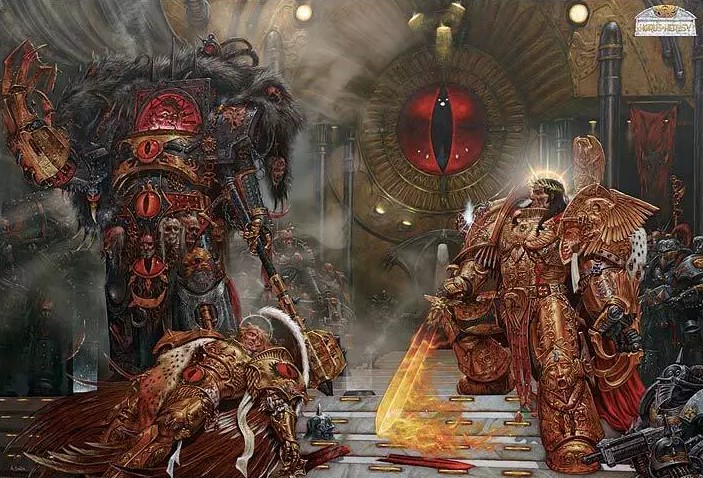
The Emperor and Horus engaged one another in the throne room of the massive Battle Barge, a battle that was both physical and psychic in nature. Though the Emperor's psychic gifts and martial skills were unequaled, He found Himself unwilling to summon His full strength against His beloved son. The Emperor suffered grievous wounds at Horus' hands, and after a score of thrusts, parries and counter-thrusts between the Emperor's Runesword and his own Lightning Claw, Horus sliced open the Emperor's chest armour, then opened his jugular and severed the tendons in his right wrist, disarming the Emperor. A psychic blast seared the flesh from the Emperor's face, destroying one of the Master of Mankind's eyes. After tearing the Emperor's right arm from its socket, Horus raised his father's broken body high over his head, and broke his back over his knee.
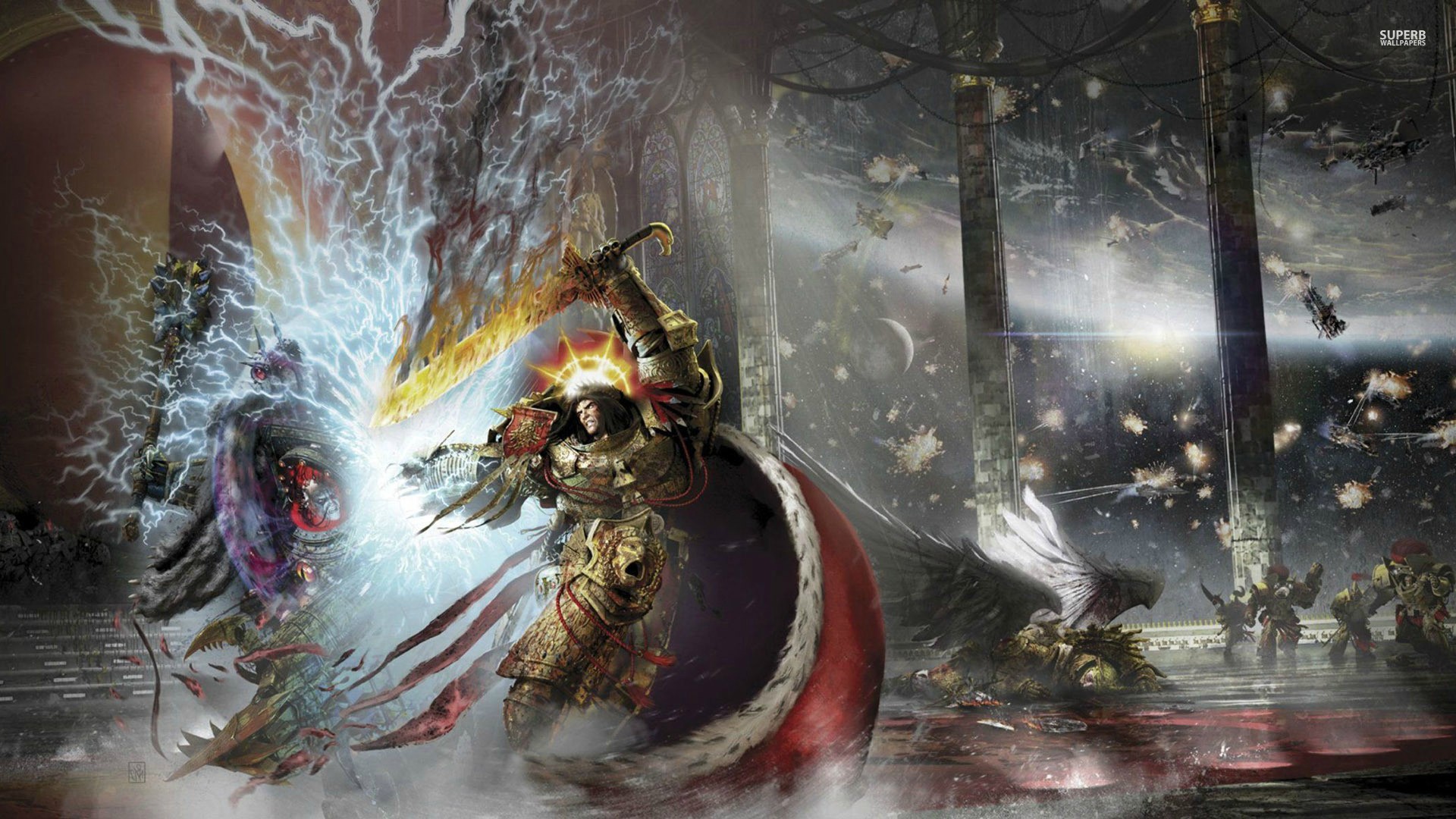
The casual brutality of the Warmaster's act galvanised the Emperor as He realised what awaited Mankind under the rule of Horus and the Chaos Gods. Realising at last that His favoured son was truly lost to the corruption of Chaos, the Emperor finally gathered His full and awesome psychic power in the Immaterium and unleashed a lance of pure Warp energy that pierced the gloating Horus' psychic defences and ripped his body apart. In some versions of the tale, this blast was only able to pierce Horus' body through the hole that had been made by Sanguinius before his death. Just before Horus died, he looked his father in the eye, shedding a single tear, begging his father to forgive him for his betrayal. The Emperor saw regret in his fallen son's eyes. The Emperor also knew that the Ruinous Powers could attempt to possess Horus again, and that He would not be there to stop his son again if they did. Driving all of the near-infinite reserves of compassion from His mind for the sake of the humanity He had served and loved all the years of His long life, the Emperor destroyed Horus utterly, his essence burned from existence in both the physical world and the Immaterium so that the Ruinous Powers could not resurrect Horus as a Daemon Prince through their claim on his soul. The destruction of Horus' soul sent a psychic shockwave surging across the Solar System, casting the daemons of Chaos back into the Warp, and spreading mass panic among the Traitor Legions and other Traitor forces on the surface of Terra in seconds as the Chaos Gods found their powers disrupted temporarily by the death of their favoured mortal vessel. It became clear to the Forces of Chaos that their leader had been defeated. A terrible, berserk fury later known as the Black Rage had encompassed the Blood Angels at the moment of their Primarch's death, and they were surging forth to scatter the attackers. Retreat turned to rout, and rout soon turned to bloodbath; thousands upon thousands of Chaos Space Marines and Chaos Titans fell attempting to flee. The ground before the Sanctum Imperialis ran red with the blood of Traitors and Heretics. Meanwhile, the Primarch Rogal Dorn finally found his way to the corrupted starship's bridge, only to discover his fallen brother, Sanguinius, and the shattered body of the Emperor, who was now on the verge of death, His remaining psychic energy spent in the battle with Horus. It was then that the Emperor whispered instructions to Dorn, urging the Imperial Fists' Primarch to take Him to the device known as the Golden Throne in the inner sanctum of the Imperial Palace. If there was a chance to save the Emperor's life, Dorn would do what he could.
Ascension
The surviving Loyalists teleported back to the Imperial dungeons beneath the Imperial Palace. Here Malcador the Sigillite, the Regent of Terra who was himself an extremely powerful psyker, had briefly taken the Emperor's place on the Golden Throne, thus keeping the Warp Gate to the Webway that the Emperor had been building for the benefit of humanity safely closed from an assault by the daemons of the Realm of Chaos. Dorn found Malcador sitting wasted, psychic energy lashing across his shriveled body, tortured by the psychic bombardments of the collapsing Imperial Webway. He was almost dead when the Tech-priests made the exchange -- disengaging Malcador from the strange machine even as they moved to modify it to support the Emperor's crippled life functions indefinitely. As Malcador was removed from the device, the last flicker of life left him and the dust of his corpse blew across the stone floor. Yet Malcador managed to prove one final time his loyalty and love for the Emperor, for despite his ordeal and agony, he still managed to gather what remained of his wasted power, and willingly forsook it to feed the Emperor and allow his master to survive.
This sacrifice restored the Master of Mankind's consciousness so that he could deliver his final instructions to His servants before being interred in the device as the Tech-priests of the Mechanicum worked furiously to modify the Golden Throne to the Emperor's specifications. Malcador's final s acrifice allowed the Emperor to awake from His coma briefly and give His servants their final orders before being interred silently for the next 10,000

The Imperium of Man had survived the Horus Heresy intact, but would evolve into the bastion of repression, ignorance and brutality the Emperor had long fought against without His direct, guiding hand upon it. In this, at least, the Chaos Gods had won a partial victory, for this state of affairs would ensure that their temptations would continue to corrupt the weaker members of the human race and prevent the final establishment of Order across the galaxy. Yet, for all its terrible and growing flaws over the next ten millennia, the Imperium would also offer humanity its best and perhaps only hope for survival in an uncaring and increasingly hostile universe.
Sources